
Cotonou is the economic center of Benin. Its official population count was 761,137 inhabitants in 2006; however, some estimates indicate its population to be as high as 2.4 million.
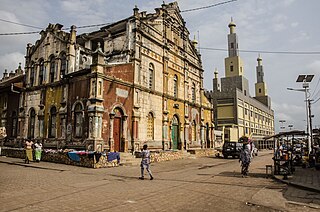
Porto-Novo is the capital of Benin. The commune covers an area of 110 square kilometres (42 sq mi) and as of 2002 had a population of 223,552 people.
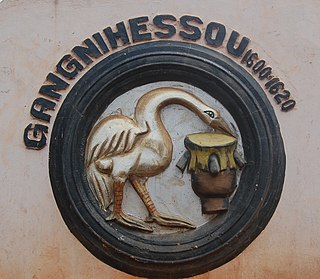
Do-Aklin or Gangnihessou or Dogbari is claimed as the founder of the Fon Kingdom of Dahomey in present-day Benin and the first person in the royal lineage of the Kings of Dahomey. In many versions he is considered the first king of Dahomey even though the kingdom was founded after his death. Very little is known about Do-Aklin and most of it is connected to folklore, but it is generally claimed that he settled a large group of Aja people from Allada on the Abomey plateau amongst the local inhabitants in c. 1620. His son Dakodonu would eventually build a palace on the plateau and began forming the Kingdom of Dahomey.

Béhanzin is considered the eleventh King of Dahomey, modern-day Republic of Benin. Upon taking the throne, he changed his name from Kondo.

Savè is a city in Benin, lying on the Cotonou-Parakou railway and the main north–south road. It is known for its local boulders, popular with climbers. "Savè" is from the historical Yoruba name Ṣábẹ̀ẹ́.
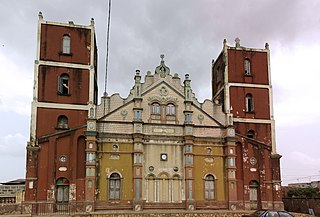
Ouémé is one of the twelve departments of Benin, containing the capital of the country Porto Novo. It is subdivided into nine communes, each centred at one of the principal towns: Adjarra, Adjohoun, Aguégués, Akpro-Missérété, Avrankou, Bonou, Dangbo, Porto-Novo and Sèmè-Kpodji. In 1999, the northern section of Ouémé

The First Franco-Dahomean War, which raged in 1890, was a conflict between France, led by General Alfred-Amédée Dodds, and Dahomey under King Béhanzin. The French emerged triumphant after winning the Battle of Abomey.
The Benin Premier League, also called Championnat National du Bénin in French, is the highest football division in Benin. The league was held in 1969 for the first time. Currently, it is composed of 14 clubs playing a double round-robin tournament. The winner of the Premier League earns a place in the CAF Champions League. The last two clubs are relegated to Second Division which is composed of 11 teams. The 2019/2020 season was cancelled due to the Covid-19 pandemic
The Benin Cup is the top knockout tournament of the Beninese football. It was created in 1974.
The Roman Catholic Diocese of Porto Novo is a diocese located in the city of Porto Novo in the Ecclesiastical province of Cotonou in Benin.

The following outline is provided as an overview of and topical guide to Benin:

Benin has abolished school fees and is carrying out the recommendations of its 2007 Educational Forum. In 2018, the net primary enrollment rate was 97 percent. Gross enrollment rate in secondary education has greatly increased in the last two decades, from 21.8 percent in 2000 to 59 percent in 2016, 67.1 percent in the case of males and 50.7 percent for females. Because of a rapid increase in the enrollment rate, the student/teacher ratio rose from 36:1 in 1990 to 53:1 in 1997 but has dropped again in the last years to 39:1 (2018). In 2018, the gross enrollment ratio in tertiary education was 12.5%.
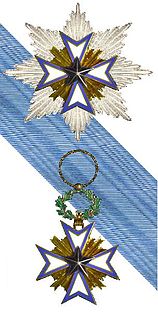
The Order of the Black Star was an order of knighthood established on 1 December 1889 at Porto-Novo by Toffa, future king of Dahomey. Approved and recognised by the French government on 30 July 1894, after the establishment of the new statutes of 30 August 1892, according this distinction to all those who worked to develop French influence on the west coast of Africa.
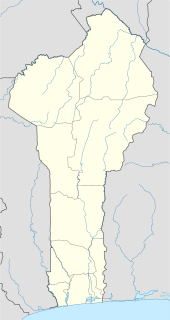
Aguégués is a town and commune in the Ouémé Department of south-eastern Benin. The commune covers an area of 52 square kilometres and as of 2002 had a population of 26,650 people.

The Dahomey Expedition commemorative medal was a French campaign commemorative medal. It was bestowed to the participants of the First Franco-Dahomean War (1890) and of the Second Franco-Dahomean War (1892–1894) in order to commemorate their feats of arms.

The Akure Kingdom is a traditional state with headquarters in Akure, Ondo State, Nigeria. It is the successor to an ancient Yoruba city state of the same name. The ruler bears the title "Deji of Akure".

Celestial City, Imeko is the Holy City of the Celestial Church of Christ (CCC). It is located in the Imeko Afon Local Government Area of Ogun State, Nigeria, very close to the border with Benin. Celestial City is known as "Jerusalem" by the celestials. The city has potential as a tourist location.
The alounloun is a Beninese musical instrument, used to play a type of music called adjogan. It is a stick with metallic rings attached, which jingle in time with the beating of the stick. The alounloun is said to descend from the staff of King Te-Agdanlin. The alounloun was established for the royal court in the Porto-Novo area; it was initially a symbol of the king's power that was later transformed into a musical instrument. It became a tradition to use the alounloun to honor eminent officials in the royal court. An alounloun is on display at the Royal Palace Museum in Porto-Novo.
The Royal Palace, also known as King Toffa's Palace and more recently Musée Honmé, is a former royal residence and today museum in Porto-Novo, Benin.













